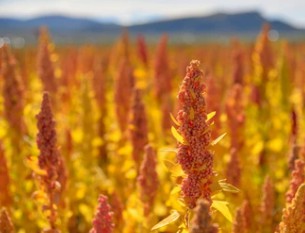Chenopodium quinoa willd. is an annual dicotyledonous plant of the genus Chenopodiaceae, whose seeds can be used as a grain. Quinoa is rich in proteins, vitamins, polyphenols, flavonoids, saponins, unsaturated fatty acids, and phytosterols, which is a high dietary fiber food with comprehensive nutrition. With the continuous human research on quinoa, quinoa has made some progress in genetic breeding. However, the progress of traditional breeding is slow, and the cycle time is long. These problems have seriously restricted the creation and promotion of new quinoa varieties. The development of genetic engineering has provided a solution for researching new quinoa varieties, which is more efficient and stable to achieve the improvement and targeted editing of genetic traits. Disease resistance, insect resistance, herbicide resistance, salt tolerance, cold tolerance, storage tolerance, high yield, and high nutritional value are the key directions for trait improvement in quinoa.

Lifeasible offers professional plant genetic transformation solutions covering all steps, from experimental design to positive transgenic quinoa seedlings. The quinoa genetic transformation experiments are based on the Agrobacterium-mediated cotyledon dip method and are operated by experienced botanical experts throughout. Our experts introduce and integrate exogenous target genes into plant cells using Agrobacterium-mediated infiltration of fresh quinoa cotyledons, followed by regeneration of transformed quinoa plants with plant tissue culture. The successful introduction of the target gene is critical and crucial for the success of quinoa genetic transformation. We have professional PCR identification tools to screen positive plants for you to ensure the success of your project. We offer a variety of genetic engineering techniques for quinoa transformation as follows.

Customers can provide constructed quinoa transformation vectors directly, and Lifeasible also offers vector construction services.
| Concentration | Volume | Other requirements |
| 80-100 ng/μL | ≥10 μL | no degradation & no contamination |
| Bacterial broth | Bacterial plate |
| Bacterial broth up to 1-year-old, preserved in glycerol | Bacterial plate activated within one week |
*For special varieties and customized services, the experiment time and the number of seeds needed may be increased. For this, please contact our staff for more information.
*Plasmids, E. coli, and Agrobacterium require cryopreservation and mailing under dry ice to avoid degradation, inactivation, and impact on experimental results.
*The strains, vectors, and receptor materials used in the experiment can be saved for free for half a year for customers, and you can pick them up at any time if you need them.
Our entire experimental process is standardized and scalable, allowing us to provide targeted transformation services for different traits. Our staff will keep our customers informed when quinoa genetic transformation experiments reach critical points and report to you regularly on the data and results at this stage. All experimental procedures will follow strict QC standards and be operated by experienced plant geneticists.
Lifeasible's experts have comprehensive knowledge and years of experience in solving technical problems and challenges in Chenopodium quinoa willd. transformation. We can provide customized solutions to help you study a wide range of quinoa varieties. Our services guarantee the success of your project. For more information or any inquiry needs, please feel free to contact us.
Lifeasible has established a one-stop service platform for plants. In addition to obtaining customized solutions for plant genetic engineering, customers can also conduct follow-up analysis and research on plants through our analysis platform. The analytical services we provide include but are not limited to the following:
July 13, 2024